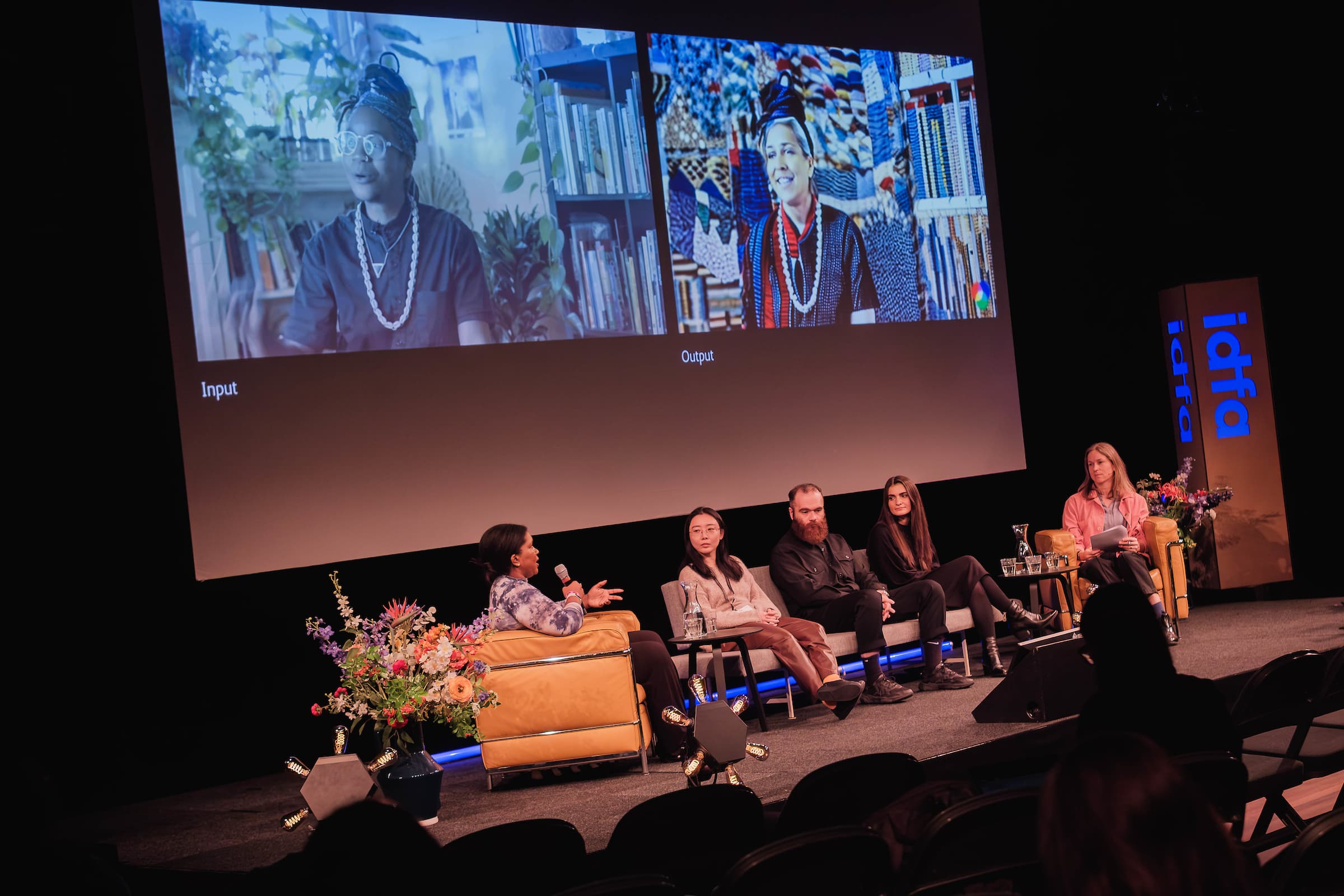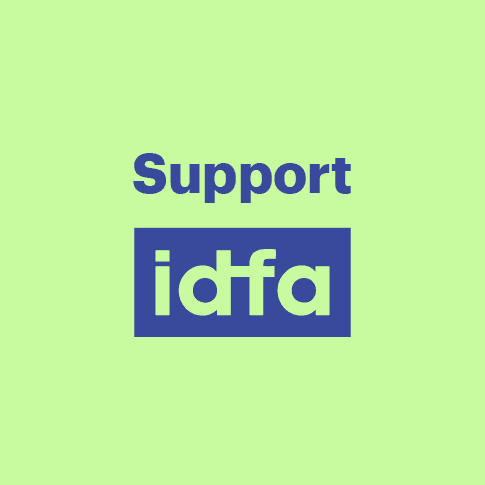
Industry Talk: Humans Have Entered the Chat
Can artists and documentary makers help us navigate AI’s transformative potential and ethical dilemmas in shaping human narratives?
On November 16 at ITA, a compelling Industry Talk: Humans Have Entered the Chat brought together filmmakers and new media artists to explore the complex interplay between artificial intelligence and human creativity.
Moderated by researcher, maker, and producer Julia Scott-Stevenson, the panel featured Tamara Shagaolu, whose new media project Oryza: Healing Ground is shown at IDFA DocLab Competition for Digital Storytelling this year; the creators of installation AI & Me mots (Daniela Nedovescu and Octavian Mot) shown at DocLab; and Chouwa Liang, presented the project Replica at IDFA Forum this year.
Through their works, the panelists unpacked AI’s capacity to reflect society and reshape our social histories. From spotlighting AI’s biases to envisioning collaborative futures, they explore how artists can help us navigate this rapidly evolving technological landscape.
Anthropomorphizing the machine
One of the central questions of the talk was: Why do we give human characteristics to AI creations? This tendency to anthropomorphize machines often reflects a yearning for self-recognition or connection. Yet, as Scott-Stevenson noted, the current discourse around AI often swings between two extremes: “Public discourse around AI is polarized. It’s either ‘Look how amazing this is!’ or ‘What are we sacrificing in this exchange?’” Documentary and artistic practices, the panelists suggested, can act as a bridge, guiding audiences to demystify AI and navigate these polarized perspectives.
Exploring human bias in AI
Romanian artists Daniela Nedovescu and Octavian Mot, known collectively as mots, presented a clip of their work AI & Me, a project showcased in IDFA’s DocLab Spotlight program. The interactive installation invites participants to see themselves through the "eyes" of AI. As Octavian explained, the project challenges participants to confront how machines interpret and judge them—and reveals biases embedded in AI systems and the societal structures that shape them. “The project is like a mirror,” said Octavian, “but it’s not neutral. It’s shaped by the data it’s trained on.”
Hacking systems for inclusive storytelling
Tamara Shogaolu, an Afro-Latina filmmaker, turned the lens to question the neutrality of archives: “Who hold power in memory? What gets saved and erased? How is AI a recording of our human record? And why are we still not talking about who is in charge of that record?”
Her immersive installation Oryza: Healing Ground, featured in the IDFA DocLab Competition for Digital Storytelling, follows the trail of Black history to unearth a variety of nearly forgotten stories. During the panel, Shogaolu spoke of her explorations into AI as a potential tool for revisionist history.
Shogaolu’s work seeks to address the exclusion of marginalized voices from traditional archives and AI-generated imagery. Using examples, she demonstrated how difficult it is to create Black characters using existing AI tools, revealing how deeply societal prejudices are ingrained in the algorithms. To question the gaze of these tools, her work tackles the question: “What would happen if I trained AI on my bias?”
Shaogaolu reveals her ambition to hack AI systems to expand their potential: “When it comes to technology, these digital infrastructures are being built as we speak. I see myself as another person who is hacking a system that is starting to change our lives.”
AI as a tool, not a threat
Throughout the discussion, the panelists emphasized the importance of viewing AI as a tool—one that requires intention, critical thinking, and labor to use effectively. “AI reflects our society, biases and all,” Shogaolu said. “But what if we trained it on the world we want to see?” This forward-thinking approach challenges creators and technologists to imagine ethical models for AI, prioritizing inclusivity and collaboration.
mots added that breaking down AI’s perceived mysteriousness can be empowering. “The more you deconstruct these systems, the more you see they aren’t magical black boxes. They’re tools shaped by human choices, and we need to learn to navigate them with literacy and intention.”
Seeking authenticity
Chouwa Liang’s work explores the emotional dimensions of human relationships with AI, particularly where emotional needs remain unmet. Her earlier documentary, My AI Lover, followed young women in romantic relationships with AI, highlighting a cultural longing for love and affirmation. Liang remarked, “Chinese women want to be loved. In a culture where expressions of affection are often lacking, some turn to AI for what feels like unconditional love.”
Liang observed that many users, including many women working in AI themselves, embrace the illusion of emotional authenticity. Do people think about what’s happening under the hood of these AI systems? “Many don’t—they just want to believe in the illusion,” she noted, pointing to the complex interplay of scepticism and longing. Her upcoming project Replica, that pitched at IDFA Forum this edition, delves deeper into these dynamics, reflecting on the societal factors driving emotional reliance on AI and questioning the implications of these connections.
Creativity to pave a way forward
As the session concluded, the audience and panelists grappled with AI’s future role in storytelling and society. Shogaolu expressed optimism about making these tools more accessible, envisioning AI integrated into public libraries to democratize its use. However, she also highlighted the hidden labor behind AI systems, reminding the audience of the human cost of training these technologies, and the implications of that cost.
For Scott-Stevenson, the potential of AI lies in its ability to foster critical conversations and expand the boundaries of creativity. “Documentary as a form can guide us through this,” she said, “helping us question who gets to train these systems, whose voices are amplified, and how we can use AI to tell new kinds of stories.”
Ultimately, Humans Have Entered the Chat underscored the need for ethical considerations in AI’s development and use. From hacking biases to imagining alternative futures, the panelists demonstrated how artists and documentary filmmakers can lead the way in rethinking AI’s role in our lives. As Shogaolu aptly put it: “AI is a reflection of us. The question is, what do we want it to reflect?”
